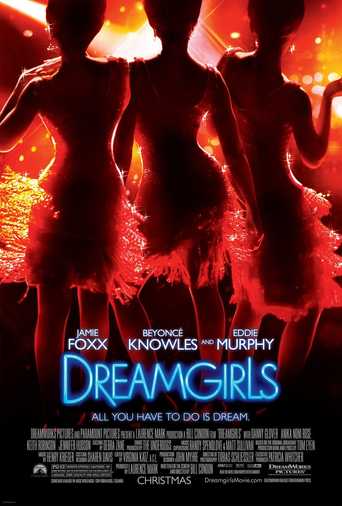 Official movie poster (DreamWorks)
Official movie poster (DreamWorks) It seemed that there was destiny (no Bey pun intended) in the air surrounding the project. Entertainment mogul and DreamGirls rights-holder, David Geffen, turned down adaptation offers for years. The infinitesimal amount that gained the slightest steam swiftly cooled off. Condon long fantasized about doing the musical, but reportedly didn't think he'd have a shot with Geffen, especially since he hadn't directed a conversion before and the majority of his resume consisted of anything but Broadway (he wrote the screenplay for Chicago in 2002). A casual conversation about Chicago with producer Laurence Mark led to a lunch date with Geffen, who stiffly reiterated his hesitance at scheduling. The immovable Geffen granted Condon his wish after hearing a roughly 10-minute description of Condon's vision.
Beyoncé Knowles' creative collaborator and choreographer, Frank Gatson, supposedly prophesied that she was Deena somehow, when she was 16. Jennifer Hudson had little notoriety and no significant acting credits then, but she beat out over 750 actresses for the essential part of Effie White...Holliday's role. Hudson's claim-to-fame was Season 3 of Idol in 2004, of which she didn't fare too well. She had to be salvaged by Randy Jackson as a "Wild Card" pick, only to eliminated again and place 7th. Like Effie, she was about to get a triumphant second wind. It might have just been extra gravity that she had the same first name and initials as her predecessor, she and Knowles were born 4 days apart in September the year DreamGirls debuted in 1981 (third "Dream" Anika Noni Rose's birthday is September 6, 1972), and the film was set for theater release on December 25, 2006...exactly 25 years and 5 days after the stage production. Sparkling fairy-dust all around, DreamGirls was revived to cast its spell on a new generation, and I was surely bewitched, bothered and bewildered. It was everything I dreamed (pun totally intended) it would be. So, in commemoration (I can't believe it's been a decade already), here are things I love and observed about one of my favorite movies.
The Aesthetic Was Magical Mr. Mistoffelees
Part of what makes DreamGirls so intoxicating is its dazzling and meticulous aesthetic. From the opening scene, everything flashes, shimmers and gleams. Elements like spinning mirrors/reflections, glitter and snapping bulbs create this sense of magic that's used to heighten and emphasize parts of the story, entrapping the viewer. Some of the most enchanting numbers are the title song and "I'm Not Going," of course. The Dreams' first performance is announced over rumbling drums and harking horns, as they appear in an iconic pose under a spotlight on a rotating platform. The angle is at such a distance and the ladies are so frozen still, it's as if they're music box figurines. When they shuffle out on stage, I could just die. It's everything I love about pop-divadom and girl-groups: precision, glamour and infectious tunes. While Deena delightfully twirls and croons "All you have to do is dream," the audience fades and all you see are a bevy of lights that look like stars. The Dreams go back into formation (I had to say that, haha) at the conclusion, and a shining press montage begins to signify their stardom. It's so beautiful and fantastic. "I'm Not Going" marks Effie's heartbreaking descent from the group. People she's known since childhood have abandoned her, and they vanish between mirrors like ghosts. She begins to plea with Curtis. It's hard to watch because you know she's been in love by herself the whole time, and he doesn't know she's pregnant. Curtis dashes out, and she's left pronouncing "you're gonna love me!" to an empty ballroom. The space becomes shadowy and hollow, with single beams highlighting her face or outlining her body, as she grips her growing belly with anguish. It's incredible how it underscores both her loneliness and defiance. In a symbolic blink, the camera pans away from her mid-note to gold curtains, fireworks and The Dreams in stance with their replacement. They not-so-ironically sing a song that has the main lyric of "Love, love me baby, love, love me, child." In the finale, the group reunites with Effie for their farewell show. The movie closes with them in one last pose, encircled by silver glitter that turns to blue, with an overlaying "twinkling" sound effect for the directing/producing credit. The next thing we see is a close-up of Deena and Effie holding hands as teens, initiating pop-art-like collage frames for the cast/crew credits. Hudson appears last for a classic "Introducing..." roll, designed for thunderous applause. These are just a few examples. If love is in the details, DreamGirls is cupid. Even the menu on the DVD is entertaining and visually captivating.
Ooh, lawd! I don't think I have to explain how magnificent the soundtrack was, but let's go ham about it! I've heard some traditionalists criticize DreamGirls for having minimal sung dialogue and being comprised of popular music. First, it would just be overkill to have sung lines on top of performances. Though, when it does happen, you're given the bread of life: "Lorrell Loves Jimmy" and "This Time, Effie White's Gonna (uh-uhh) Win (nnn)" are nothing to toy with or ignore. Second, you'd have to be deaf (or too stuck in conventions ) to not hear the theatrics lying within the structure. These songs are mini-epics; beautiful orchestrations with intricate dynamics that fully embody their intended emotion and the specific characters performing them. Effie's transformation is audible through "I Am Changing's" soulful exchange of gentle touches and dramatic flourishes (I love the piano rolls). Sinister composition counters gospel and snazzy show-biz panache on "Steppin' to the Bad Side," as C.C. takes on Curtis' "By any means necessary" mindset to get ahead. "Listen" may have audacious lyrics, but its arrangement is light, unthreatening and facile, capturing Deena's passive and cowardly temperament. She has all these feelings, but never has the guts to express them directly to Curtis; she exposes him under-the-table and only confronts him when she's caught packing her bags. "Love You I Do" is joy personified. "One Night Only" is so gorgeously histrionic, you'd think it was about something excruciating, rather than a one-night stand. By the way, Deena's disco version makes me want to barf, though I adore the movie scene. Among other things, that "Come on, baby, one night" intro was so campy, but that was the point, right? Still, I'd be lying if I said I didn't play it on purpose a couple of times.
I was so enthralled by the toe-tapping, spirited music, I had to have the 1:32 short "Heavy" and the "Dreamgirls/I'm Not Going/Love You I Do" instrumental in the credits (it's fab). I even liked the white-bread rendition of "Cadillac Car." The cast sounded so wonderful together, I low-key hoped they'd do a side record. The "we are growing free" part on "Family" makes me melt every time. It was also pretty neat to hear what Beyoncé sounded like with another ensemble. Anika Noni Rose and Sharon Leal (who portrayed Michelle; check out her background) are very underrated. Big things really do come in small packages; Rose knocks me off my feet with so much vocal power in such a little body. Murphy pleasantly surprised me; he sings a lot better than I imagined. Apparently, music has been a serious passion of his for eons (there's something past "Party All the Time"). The only song I never listen to is "When I First Saw You," but I didn't bring it up to discuss my personal distaste for it, haha. Its presentation in the movie (and unnecessary duet remix on the album) gives the impression that it has a romantic context, but I think Curtis is literally singing about how his dreams came to fruition and manifested through Deena. Between his cold and calculating business tunnel-vision, and how he repeatedly objectifies and degrades her, my interpretation isn't a stretch. When he corrects her hair and tilts her face with laser-focus during a photo-shoot, it screams "you're my personal Barbie doll."
Being a time-piece with an entertainment industry backdrop, DreamGirls provides a look into the practices and trends of the music business during the late 1950's-mid 1970's, and in particular, their effects on black artists. Unfortunately, many of the issues depicted are still relevant. For example, performers of color are still expected to make their brands palatable to the majority-white, American audience so they can "crossover" and attain high-visibility. Meanwhile, white artists are able to adopt any style they wish, and receive both acclaim and origination credit. I recently had a conversation related to this and ironically mentioned Hudson: "When white listeners explain why they love Adele, they often say it's 'because she's so soulful,' but they won't buy an album from Jazmine Sullivan, Andra Day or Jennifer Hudson."
There's No One to Like
Ruthless and scheming opportunist Curtis Taylor Jr. (Jamie Foxx) is understandably considered the villain in this story, but in actuality, all of the characters are truly awful people, haha. Birds of a selfish feather flock together. Let's start with Ms. Jones: Deena pretended to resist being lead of The Dreams and in Curtis' bed, but early-on during "Love You I Do," she's too elated to catch his eye while trying on a gown. Guess she made up her mind at that moment to sleep her way to the top, 'round and around. Like the poltroon she was, she continued to play coy when Effie called her out for "stealing her dream and her man." I was like "Bish, whatchu' still lying for?! Might as well own it!" Later, Deena watches her bio-reel and has this disgusting look of pride on her face when her wedding to Curtis is covered. I wanted to slap her so hard. She only tries to right her wrongs with Effie when she's had enough of Curtis' controlling ways. Though it's saying the least that Effie was slighted, she was no bag of sugar herself beforehand. She constantly bossed around and belittled her group-mates, Deena and Lorrell, and was only concerned with what was best for her. Not to mention, she had a horrible attitude: even after falling completely down on her luck, she still needed to be scolded by Marty (Danny Glover) to shape up. C.C. (Keith Robinson; what does C.C. stand for, anyway?) was a gullible, spineless milk-sop who threw his own sister (Effie) under the bus for gain; he too came crawling back after being bitten one too many times by snake Curtis. When C.C. threatens him, Curtis retorts, "You couldn't kill sh*t." I always laugh and say "REAL!" Lorrell (Rose) is adorably ditzy, but she's a home-wrecking mistress. When she complains that she's had "11 years of unmarried bliss" with Jimmy Early, it's like "really, girl?" Her most observable instance of self-absorption/selfishness is when she assumes Curtis is out to break up her affair when he announces The Dreamettes will stop singing for Jimmy. She accuses everyone of being jealous, but once she hears the split is because the trio will become their own act as "The Dreams," she gladly declares she "can't be singing back-up" forever. Jimmy (Eddie Murphy) is a womanizing, rude and cocky egomaniac who seeks out youth and naiveté to take advantage of. When Lorrell rebuffs his advances initially, he arrogantly claims "Oh, so it's going to take 2 weeks." That line makes me shudder and shake my head; so creepy.
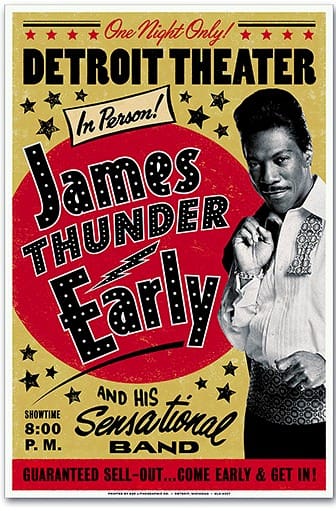 Eddie Murphy as Jimmy Early (Eric Scott Rosenberg)
Eddie Murphy as Jimmy Early (Eric Scott Rosenberg) I know I just totally slammed Jimmy, but I did that to everyone, haha. Jimmy takes a major backseat once The Dreams take off, yet, he's one of the most memorable forces in the movie. It's no wonder Murphy picked up so many Best Supporting Actor award nominations. Jimmy's eccentric, vibrant, inviting and comedic energy is almost non-existent among the rest of the "take myself way too seriously" crew, so it's lamentable when Curtis is successful at breaking his soul, both literally and figuratively. He went from sardonically spurning C.C.'s songwriting and Curtis' management tips, to relying on C.C. for a "new sound" to impress Curtis (i.e. "Patience"). He went from saying "You got to have soul!" as a prerequisite for his work, to doing nothing but sappy ballads. A once established artist who was The Dreamettes' ticket to Tinseltown, had become their side-dish. It seemed he never quite caught the hint that he was being used as a launch-pad, and Curtis had no intentions of redeveloping his career. He turned his back on Marty, gave up his public standing and sacrificed the integrity of his art for a "crossover" that ultimately didn't benefit him. Perhaps Jimmy's tale is commentary on selling your "soul" and the legions of real-life entertainers who felt pushed into or fell victim to assimilation.
When Curtis rejects "Patience," Jimmy immediately pulls out cocaine. The others beg him not to use it: "Come on, brotha', it's Christmas," C.C. beseeches. Jimmy has this pitiful, aggrieved look on his face like, "What else would you have me do?," but he has some fight left in him. Much to Curtis' chagrin, Jimmy does an impromptu funk song at the Rainbow Records tribute concert, proclaiming "Sooner or later, a time comes around for a man to be a man and take back his crown...I like Johnny Mathis, [a pop balladeer] but I can't do that stuff..." He then hysterically drops his pants to reveal his boxers on live television. Although he's dismayed and disquieted when his stunt doesn't work and Curtis fires him, he maintains his pride: "I don't beg! I don't crawl! I'm an original!" Lorrell, who's irrevocably tired of being "the other woman," dumps him seconds later. This is the defeating setback for him, as he overdoses on heroin not long after; he was dead for over a day in a hotel room before he was found. I've read that in the stage version, Jimmy doesn't die or have a drug problem. As much as it pained me to watch his decline, death and paltry, snowy burial service, I'm glad these things were added. There's symbolism in seeing a larger-than-life figure, whose last phrases included "You can't kill a man with soul!," expire the way he did. Further, this corporeal casualty really denotes the gravity of Curtis' insidiously treacherous effect on the troupe, and subsequently accentuates Effie's prevail: one made it out, the other didn't.
Curtis is kind of an idiot for not continuing to support Jimmy; there was extra money to make. Not to mention, it was a bit incongruous of him to go on about cultural appropriation and black-owned business to Marty and Jimmy, when all he did was play into the unwritten rules set by a white-dominated industry. Seconds before news of Jimmy's death reaches Rainbow, C.C. churns to Curtis, "I didn't think it was possible that you could squeeze any more soul out of my music...What about the lyrics? That [disco] rhythm takes all the feeling out of the music."
I'm Still Pissed Off About the Oscars
A funny thing happened on the way to the Academy Awards, A.K.A. the Oscars, in 2007. After early screenings with journalists and one at the Cannes festival, DreamGirls was widely deemed an Oscar frontrunner. It went on to be ranked 4th on the American Film Institute's Best of 2006 list and won 3 out of 5 Golden Globes, including Best Picture-Comedy or Musical, Best Supporting Actor (Murphy) and Best Supporting Actress (Hudson). It also received nods and trophies from the Screen Actors Guild, the Producers and Directors Guild of America, the Broadcast Film Critics Association (Critic's Choice Award), the NAACP, the British Academy of Film and Television Arts and the International Press Academy (Satellite Awards). In the end, however, the Oscars opted to rain on the parade with a backhanded compliment: the film was given the most nominations of the year with 8, but not in the top categories of Best Picture, Best Directing and Best Actor/Actress (there wasn't even one for Best Adapted Screenplay). It was a historical first for a movie to get that many nods without one for Best Picture. The spit in DreamGirls' face was extra thick. Despite having favorable odds as a musical with a superb soundtrack and 3 out of 5 available entries ("Love You I Do," "Patience," "Listen")--the most for any live-action motion picture-- it still lost to An Inconvenient Truth's "I Need to Wake Up" by Melissa Etheridge.
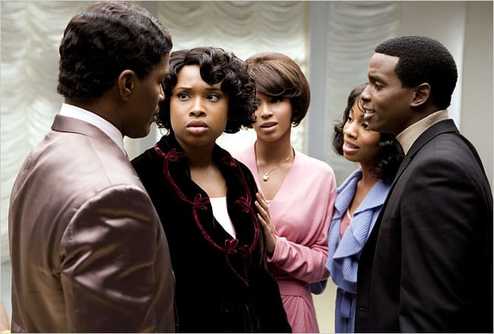 The crew talks Effie down in "Family" (DreamWorks)
The crew talks Effie down in "Family" (DreamWorks) I was and still am stewing over this, especially about Best Original Song. If DreamGirls wasn't good for anything else, it was the music. Every time I listen to the album, I think "Why did the academy tease them with 3 nominations? This record is everything; it didn't deserve to be taunted and dismissed like that." The whole thing felt like such a disrespectful and blatant snub. "Love You I Do" garnered a Grammy for Best Song Written for a Motion Picture, Television or Other Visual Media, while the soundtrack received Best Compilation Soundtrack Album for a Motion Picture or Television. I suppose grabbing the musical equivalent of an Oscar is somewhat of a consolation prize; the key word being "somewhat."
Daydreams (Assorted Thoughts)
1) The art mockups and costumes were spectacular! Again, no fine-detailed rock was left unturned. I wish I could get my hands on copies of the posters and album covers (many were replicas of actual Supremes records) that were featured (graphic designer Eric Scott Rosenberg produced them). Every other fashion look was my favorite, but topping the list was Deena's day suit when she went to see Curtis about doing Cleopatra, and The Dreams' "It's All Over" gowns. The suit was simple, yet classic and elegant...dainty, yet, authoritative. Watching her walk with that air into Curtis' office past a titanic mural of herself with a perfect 70's Afro was breathtaking.
2) Were Curtis and Jimmy statutory rapists? The Dreamettes are teenagers at the start of the movie. Deena is panicked because she had to sneak-out to make the performance. Curtis assures the girls that his Aunt Ella will look after them to convince them to go on tour with Jimmy. Given that he's making this promise (and was previously married), Curtis is presumably an adult. That same night, Jimmy instantly sets his eyes on Lorrell. When Deena confronts Lorrell in a later scene about sleeping with him, she says "How could you? You're just a baby."
3) I mentioned The Color Purple earlier. I so wished Deena would have pulled a Celie and put a knife to Curtis' neck when he berated and debased her at the dinner table for taking on a movie behind his back.
4) It's probably deliberate, but it's fascinating to me that "Family" is 1 song away from "I'm Not Going." C.C. tells Effie "you're not going anywhere," only for her to have to assert that she's not.
5) What kind of black mama from Detroit did Deena have?! When Curtis pompously describes Deena like the product he sees her as, her mother frowns and that's it. She didn't go off on Curtis or try to pull Deena out of the group. She didn't even stand up to him when she hears him yell "Deena get your ass down here!" toward the end of the film. Guess the docile apple doesn't fall far from the docile tree.
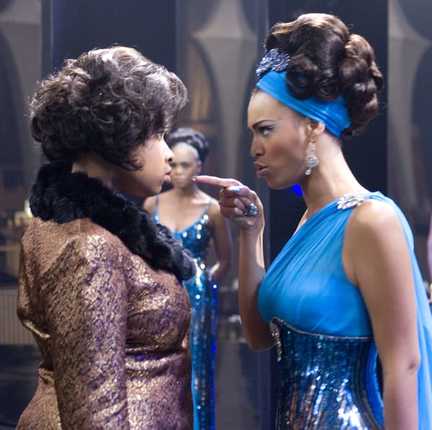 "It's All Over" for Effie (DreamWorks)
"It's All Over" for Effie (DreamWorks) 7) The Jackson 5 wasn't anywhere near as Velveeta cheesy as the Campbell Connection, haha. That "Perfect World" song was so lame and not remotely suitable as a "I Want You Back" knockoff.
8) When Jimmy performs at a ritzy, whites-only club ("I Want You Baby"), the comedian/host makes a joke about how blacks can both clean floors and be entertaining. It ticks me off every time. He also insults Cubans, but I don't quite understand the smear. He says a black man could maybe move into his neighborhood, but tells a Cuban diner that he wouldn't have a chance. Can anyone shed some light on this? Why were Cubans non-negotiable? Anyhow, when Jimmy souls-it-up and pelvic thrusts discomfort into the audience members, a black waiter is seen smirking with satisfaction. I smirk right along with him.
9) Was putting Beyoncé in brown body paint during "When I First Saw You" really necessary? That always made me uncomfortable. Newsflash: Beyoncé is already black and not every person from Africa is dark or brown skinned.
10) When I hear Deena tell a movie director (Jon Lithgow) "I ain't never met a sista' named Dawn," I always chuckle and think "Dawn Richard."
11) Anyone else notice how many times Curtis says "Trust me?" A car salesman through and through.
12) To this day, I quote and sing lines from DreamGirls on a regular basis. The average person might say, "I can't!" when they find something hilarious. Me, I say: "Curtis, I cain't!" I don't remember how it got started, but my friends and I texted "It's All Over" in its entirety once. Chocolate cake and sandwiches are never mentioned without me saying "Jimmy want a piece of yo' chocolate cake!" and "How many times have I told you no mayonnaise on the chicken sandwich?!" My #1 favorite quote is: Lorrell--"What does R&B stand for?" Jimmy--"Rough and black." Some of my other loves include:
Lorrell: "You got the same wig I got?"
Effie: "Yeah."
Lorrell: "You got the same dress I got?"
Effie: "Yeah."
Lorrell: "Then shut up!"
Jimmy: "Jimmy got, Jimmy got, Jimmy got soul!"
Effie: "I don't do 'oohs and aahs.' Singing backup is a trap."
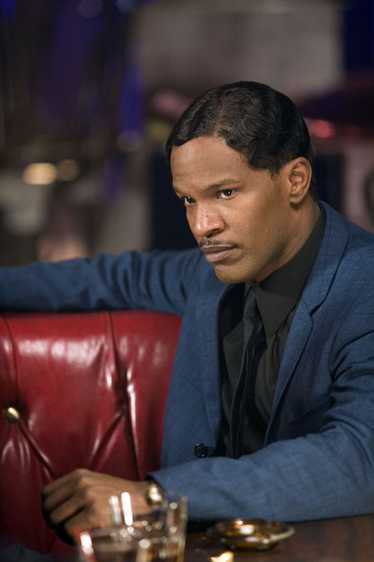 Jamie Foxx as Curtis Taylor Jr. (DreamWorks)
Jamie Foxx as Curtis Taylor Jr. (DreamWorks) A) Jimmy wasn't scripted to croak in the play, but Effie was. Real-life inspiration Florence Ballard struggled with depression, alcoholism and poverty amid her time with The Supremes before dying of cardiac arrest in 1976 at age 32, but Jennifer Holliday allegedly quit the project twice during development because she objected to Effie's death and lesser focus in comparison to Deena. The plot was obviously amended to her liking. I wonder if we'll ever know what the original layout was.
B) Sheryl Lee Ralph and Emmy Award winner Loretta Devine rounded out The Dreams on stage with Holliday. Devine made a cameo in the film ("I Miss You, Old Friend").
C) If my estimations are correct, The Dreamettes formed in 1959, Curtis enters the picture in 1964, Effie is out of the group in 1966 and the story concludes in 1975.
D) With a reported budget of $75 million, DreamGirls is the most expensive movie with an all-black cast in history.
E) Fantasia Barrino, Hudson's fellow Idol and winner of Season 3, also auditioned for the role of Effie. She, Hudson and contestant LaToya London made up their own DreamGirls; they were known as "The Three Divas." All of them could throw down vocally, but ended up in the bottom 3 multiple times, and once together the night Hudson was axed. Singer Elton John said publicly that he felt the voting outcomes were racially prejudiced.
F)There was some uncertainty that Beyoncé could pull off playing the meek and vocally indistinct Deena, but she proved herself with a successful audition. She went so far as to lose significant weight to transform herself into Deena (Diana Ross was always very thin), and said she heavily studied footage of The Supremes. This was evident, as many of her mannerisms and facial expressions well-emulated Ross. At the Rainbow Records concert, Deena comes down the aisle grabbing fans' hands and says "Hello, America, I love you too," and winks flirtatiously. It makes me want to gag, it's so Diana. Though it could be argued Beyoncé's vocal performance still wasn't restrained enough, it was a perceptible difference for her. She stated she was eager to sing "Listen" live because she could grunt, growl, do what she wanted and not hold back. Staying in character during filming cultivated pent-up, aggressive energy that she channeled into her feisty second solo-album, B'Day. It was a thrill and honor to portray Deena, but she was ready to shed her alter-ego. As a fan, I was too, haha. Chile, I was so glad to see ThickOncé (and her thighs) return at the 2006 MTV Video Music Awards. I also never play the soundtrack version of "Listen;" only The Oprah Winfrey Show performance will do.
G) I love how Jimmy accuses James Brown, Otis Redding and Little Richard of stealing his show style; artists the character is comprised of.
H) Curtis turning down "Patience" was purportedly inspired by the story of Berry Gordy being cynical about Marvin Gaye's "What's Going On."
Curtain Call
I love so many things about my black culture; one is how expressive we are when we see our films. We give commentary, yell at the screen, holler laughing and cry in unison. When my family went to see DreamGirls on Christmas evening 10 years ago, it was no different. My mother tried to pipe my father and I down, for fear we'd appear unsophisticated to the scatters of white patrons in the audience, haha. I cared not; especially on this night--I was finally seeing DreamGirls live and in living, vivid color. Jennifer Hudson, the talent show contestant with no acting resume, won everyone over and it showed. Applause from "I'm Not Going" went well over into the next scene. At "Effie White's Gonna Win," people boisterously laughed, clapped and taunted Curtis with "Heh-hehs." Those fancy credits I described earlier? "And I am telling you" (I make cheesy puns, okay?) they did their job, because no one moved until they stopped. When Hudson's face emerged, she was given a standing ovation as if she was physically present. There were cheers when Jimmy dropped his britches; yes, it was funny, but I think it was also because he stuck it to Curtis. I don't know why this made me so happy, but I got a lot of joy out of watching my funk-loving musician father giddily bob his head to "Jimmy's Rap." When Deena said to Curtis, "Let me have your child," someone loudly blurted "Eww!!!" and the crowd erupted in laughter. On several occasions, people responded to each other's statements. I had this fun, collective experience every time I saw DreamGirls in the theater. You didn't think I saw it just once, did you? I lost count, honestly. I couldn't wait until it was released on DVD; I bought the 2-disc "Showstopper" edition (the bonus features are awesome) and watch it about once a year. Reliving the film and its associated interviews and performances for this article have been such a treat. I've fallen into a YouTube vortex several times over, and I'm not even a pinch tired of it yet. In fact, I think I'm going to go watch it now. *Holds hand out* And all you have to do is dream....All you have to do is dream...All you have to do is dream! And baby! We'll be there!!!
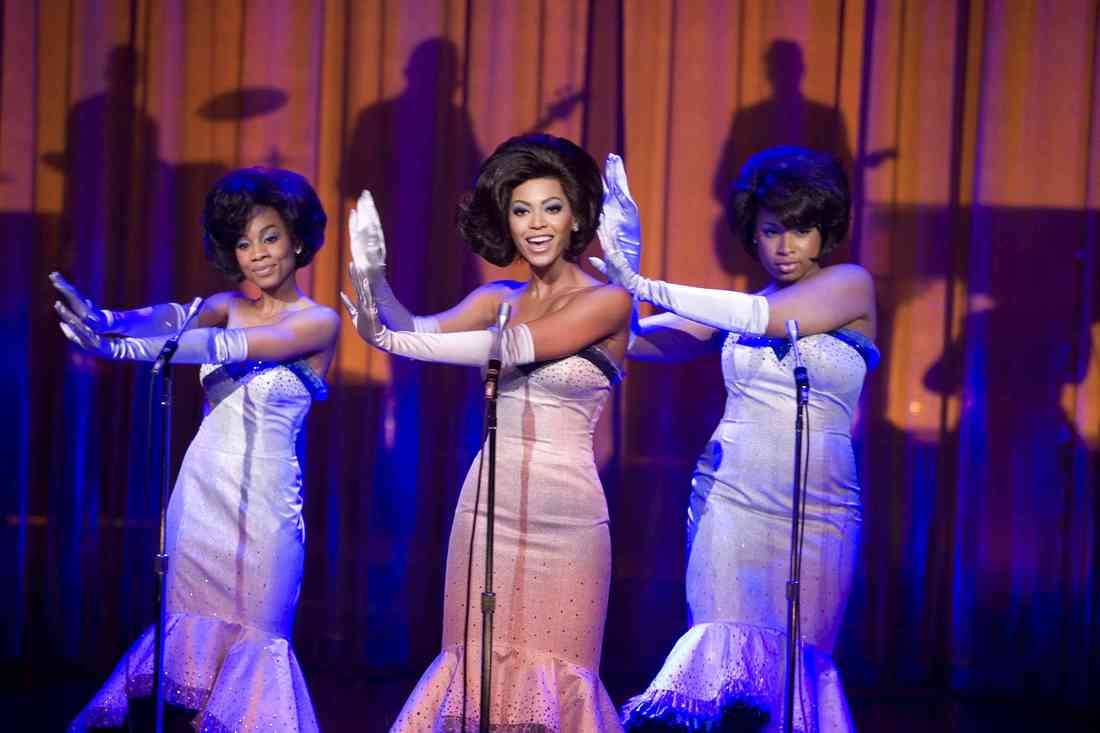
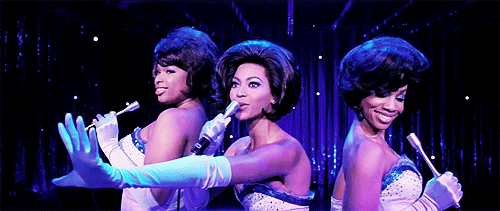
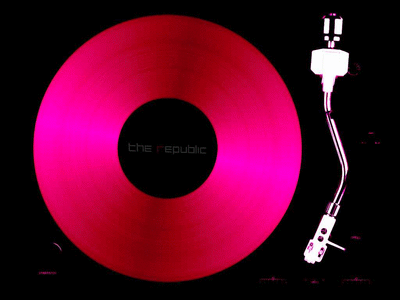
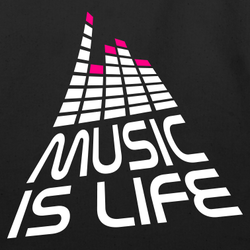
 RSS Feed
RSS Feed